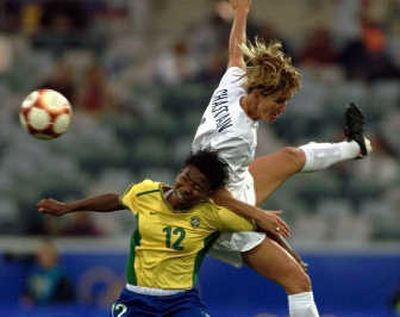Second chance: New women’s soccer league planned

Rumors have been floating around for a while, but now it’s finally official.
Five years after the WUSA folded in 2004, professional women’s soccer will make its return to the national sports landscape.
A new women’s professional soccer league under the temporary working title of Women’s Soccer LLC will begin play in the spring of 2009.
The league will start off with teams in Los Angeles, Boston, Chicago, Dallas, New Jersey/New York, St. Louis and Washington D.C.
“Careful consideration was taken in timing the launch of the league, as team owners are being judicious to ensure that this league is sustainable and successful in the long run,” league commissioner Tonya Antonucci said in a press release. “It’s a simple matter of preparation and operational readiness.”
Antonucci said that financially the league had actually secured enough support to begin operations as early as 2008. But team owners decided on a 2009 launch in order to accommodate players’ national team obligations, and to capitalize on the attention the 2007 FIFA Women’s World Cup and the 2008 Olympic Games would bring the sport.
“We did not want to impact the various national teams between these two events and we did not want our league to take the focus away from these two great events for our players or our fans,” said Michael Stoller, managing partner for Boston Women’s Soccer, LLC, the owners of Boston’s professional women’s team, the Boston Breakers.
Former U.S. women’s team standout Tiffeny Milbrett believes that the new league will be a hit with both domestic and international players.
Milbrett was part of the high-profile national team squad that boosted women’s soccer into the limelight after winning the 1999 Women’s World Cup. She also played for the WUSA’s New York Power, and she helped to co-found that league in 2001.
Even though she’s now retired from international play, Milbrett, 34, is still playing competitive soccer. She recently wrapped up her second summer season with the Vancouver Whitecaps, a W-League amateur club, and before that she spent three seasons with Swedish semipro club Sunnana SK.
Milbrett has yet to decide if she wants to play in the new league, but based on her experiences overseas, she says the league will attract top-level talent from all over the world.
“Even when I was playing in Sweden, it’s almost like the situation in the NHL – there are all these great players in Russia and Sweden who dream of coming over to the United States to play soccer,” Milbrett said. “When I was there, I fielded so many questions from them like, ‘When’s the league coming back? How many teams will there be? I want to go try out.’ ”
Many of those women play for well-established semipro and pro leagues in their own countries, but not unlike the situation in baseball – which attracts Japanese and Latin American players every year – these women would be willing to come give an unproven product a chance based solely on the understanding that pro sports in the United States has historically been a viable means of making a living.
“With most other leagues in the world, the players play in the league but also have to do another job,” said Danielle Fotopoulos, another former national team player who now coaches soccer in Tampa, Fla. “Here, you’re paid to play. And that’s your job. You try to make it just as a professional soccer player, not as a teacher and a soccer player.”
The WUSA had several international players including Norwegian star Hege Riise, Brazil’s Katia, and Germany’s Birgit Prinz, who now plays for Real Madrid’s women’s team.
But former WUSA players Fotopoulos, Milbrett and Brandi Chastain, who were in Spokane Valley for a soccer clinic last week, say that the quality of action on the field was never the problem. The former league’s downfall was its unsustainable and unrealistic business model.
“I think people at the time didn’t realize how much it would take to even run a gameday operation,” said Chastain, who played for the San Jose CyberRays. “For example my San Jose team’s budget was the same as the team in North Carolina. And that’s ridiculous because the cost of living in those two places is completely different.
“My organization was spending $55,000 just to use the stadium, while they didn’t have that charge in North Carolina because the owners owned the stadium.”
These are the kinks that Antonucci will have to work out before the league begins play in 2009. The new commissioner is committed to ensuring that the new league does not follow in the shoes of its predecessor.
“We’d be remiss in not examining the operations of the WUSA and learning from their experiences, particularly in the realm of operational efficiencies,” Antonucci said. “The new league is taking every step to ensure that this league is a permanent fixture on the nation’s professional sports landscape.
“We are not expecting overnight success, but are committed to long-term growth and profitability.”